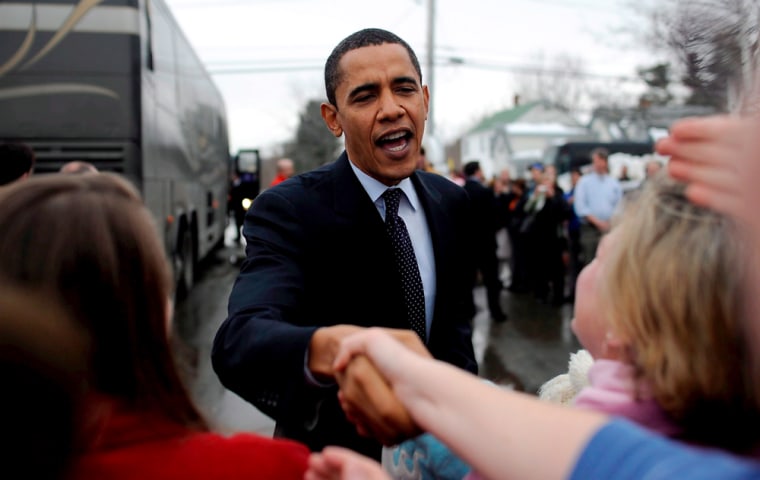What can Berlin, N.H., teach the rest of America about the presidential campaigns that just swept through town?
And what does Berlin's primary outcome teach Democratic candidate Barack Obama and his team of strategists?
Berlin, way up north in the White Mountains, is far off the beaten path, far from major airports or even an interstate highway. It's an old paper mill city where economic development is still a pipe dream.
People aren’t rich in Berlin. You can buy a three-bedroom, two-bathroom house there for $75,000. The closest Starbucks is 80 miles away.
When voters cast their ballots on Tuesday, Sen. Hillary Clinton crushed Obama in Berlin, beating him more than two to one.
She got 49 percent of the vote there, exceeding her statewide average of 39 percent.
Obama, with 22 percent, came in third in Berlin, just behind John Edwards, whose combative economic populist message seemed to play better in this mill town.
Another working-class town that's also a little rough around the edges is Claremont, where Clinton beat Obama, 43 percent to 35 percent, with Edwards drawing 17 percent.
Clinton also bested Obama in working-class towns on New Hampshire's Atlantic coast.
A reprise of Gore v. Bradley
In some ways, Tuesday's Clinton-Obama-John Edwards contest resembled the Al Gore and Bill Bradley's 2000 battle in New Hampshire.
Sounding like Obama eight years before Obama arrived on the scene, Bradley claimed to represent a “new kind of politics” – less partisan, more consensus-minded and less interested in settling scores.
In Berlin in 2000, Gore trounced Bradley, getting two out of every three Democratic voters.
“There’s a history in the New Hampshire primary of reform-minded insurgent candidates going against the more Establishment candidate who presents a traditional, bread-and-butter message,” said Dante Scala, a political scientist at the University of New Hampshire.
Scala thinks that Obama vs. Clinton fit this template.
“Match the Bill Bradley vote in 2000 against Obama and you’d see a lot of similarities” in where each ran strongest, Scala said.
“Working-class Democrats hear this talk about reform and change, and they wonder, ‘what’s it going to do for me?’” Scala said.
Lagging among lower-income voters
Exit poll interviews indicate that Clinton triumphed over Obama among voters with family incomes under $50,000, winning 47 percent of such voters to his 32 percent. Edwards got 16 percent.
Obama’s best-performing income group: the super-rich, those with incomes of more than $200,000, among whom he got 44 percent of the vote to Clinton’s 36 percent.
Unfortunately for Obama, the super-rich only made up 5 percent of Tuesday's electorate.
The Illinois senator also faces an age gap: Among New Hampshire voters over 65, 48 percent chose Clinton and 32 percent Obama.
Clinton also beat Obama by more than two to one among those who said they had not graduated from high school.
Catholics, mostly French-Canadian and Irish, make up a key segment of the Democratic electorate in New Hampshire and Obama didn’t seem to have great appeal for them, either.
He got 27 percent of self-identified Catholics; Clinton got 44 percent, while Edwards won 24 percent.
Obama won New Hampshire towns that are home to left-leaning, college educated and affluent voters, such as Peterborough, where he got 47 percent to Clinton’s 26 percent, and Exeter, where he got 43 percent to her 35 percent.
But one New Hampshire Democratic analyst said Obama’s number in Exeter was slightly worse than he’d have expected given the track record in Exeter of past liberal favorites such as Bradley and Paul Tsongas in 1992.
The Wilder/Bradley effect?
So here's the question that was being asked Wednesday, given that pre-primary polls showed Obama ahead of Clinton by 10 points or more: Did we see on Tuesday night a New Hampshire version of the Doug Wilder/Tom Bradley effect?
Obama spoke to this topic during the very first trip he made to New Hampshire in December 2006.
He noted that when black candidates Wilder and Bradley ran for governor of Virginia in 1989 and California in 1982, respectively, pre-election polls predicted that each would get a higher share of white voters than they in fact won on Election Day.
The theory was that white voters were reluctant to tell pollsters that they did not want to vote for a black candidate; so Wilder and Bradley over-performed in the pre-election surveys.
Obama argued in 2006 that race and skin color were dwindling as factors in elections and said Tennessee Senate candidate Harold Ford “actually surpassed what the polls would have indicated. That, I think, points to the progress we have made.”
Whether voters shied away from Obama because of his name, his skin color or his lack of experience in Washington is impossible to know. Exit polling did not ask about the race question.
Clinton surges among women
Scala said, “My gut tells me it was more a gender thing than a race thing.”
Clinton easily beat Obama and Edwards among women voters, who made up nearly 60 percent of the electorate.
Obama’s strategists are left with one inescapable lesson from Tuesday’s voting: Their candidate does not have sufficient appeal to older, less-educated, lower-income and Catholic voters.
The idea is that Obama and his stump speeches play better among wealthier, better educated people — and there aren’t enough of those voters to win a Democratic presidential primary.
An ideal focus group for Obama strategists in the next week or two would be a dozen lower-income voters in Connecticut and New Jersey, states that vote on Feb. 5.
Mix in a few senior citizens, too.
Maybe the folks in that group could tell Obama what he is saying, or not saying, that has caused him to fall flat with these voters.
"The fierce urgency of now" is not enough for them.
